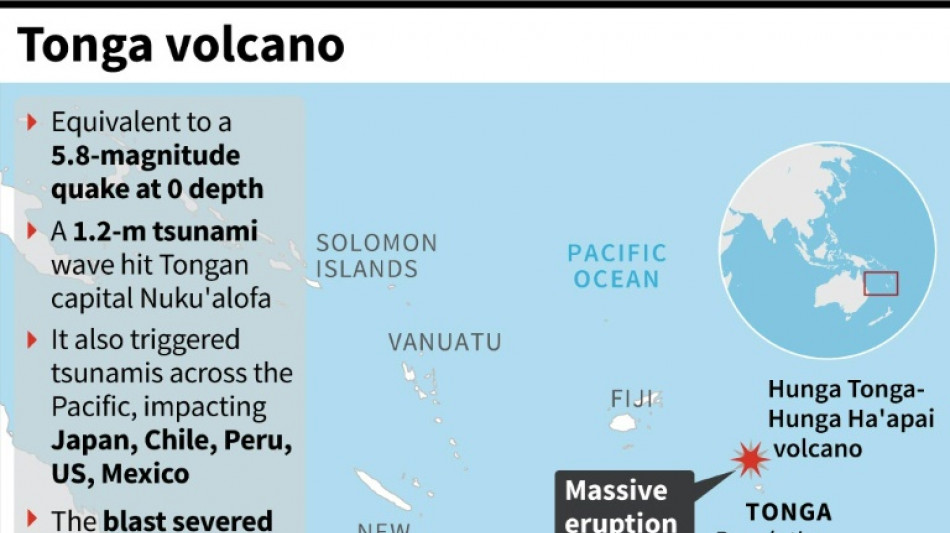
-
 Turkey's opposition says Erdogan's canal plan behind latest arrests
Turkey's opposition says Erdogan's canal plan behind latest arrests
-
Maresca hails 'nasty' Chelsea as top five bid stays alive

-
 Trump raises Putin doubts after Zelensky talks at pope's funeral
Trump raises Putin doubts after Zelensky talks at pope's funeral
-
Major blast at Iran port kills 4, injures hundreds

-
 Napoleon's sword to be sold at auction in Paris
Napoleon's sword to be sold at auction in Paris
-
Iran, US discuss nuclear deal in third round of talks

-
 Buenos Aires farewells native pontiff with call to action
Buenos Aires farewells native pontiff with call to action
-
Warholm sets hurdles world record at Diamond League, Holloway shocked

-
 US students 'race' sperm in reproductive health stunt
US students 'race' sperm in reproductive health stunt
-
Wikileaks founder Assange joins crowds for pope funeral

-
 Leader Marc Marquez claims Spanish MotoGP sprint victory
Leader Marc Marquez claims Spanish MotoGP sprint victory
-
Celtic win fourth successive Scottish Premiership title

-
 Jackson ends drought as Chelsea boost top five push
Jackson ends drought as Chelsea boost top five push
-
Warholm sets 300m hurdles world record in Diamond League opener

-
 Major blast at south Iran port kills 4, injures hundreds
Major blast at south Iran port kills 4, injures hundreds
-
Russia says retook Kursk from Ukraine with North Korean help

-
 Francis laid to rest as 400,000 mourn pope 'with an open heart'
Francis laid to rest as 400,000 mourn pope 'with an open heart'
-
Trump, Zelensky meet on sidelines of pope's funeral

-
 'Shared loss': Filipino Catholics bid Pope Francis farewell
'Shared loss': Filipino Catholics bid Pope Francis farewell
-
Families unable to reunite as India-Pakistan border slams shut
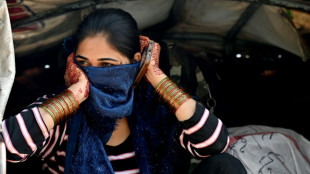
-
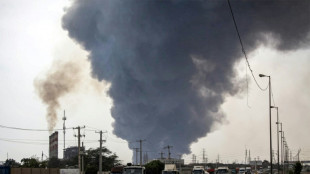 Major blast at south Iran port injures hundreds
Major blast at south Iran port injures hundreds
-
Foreign carmakers strive for 'China Speed' to stay in race

-
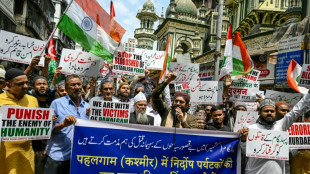 Pakistan says open to neutral probe into Kashmir attack after India threats
Pakistan says open to neutral probe into Kashmir attack after India threats
-
Hundreds of thousands at funeral mourn pope 'with an open heart'
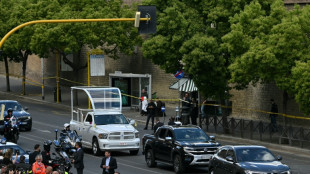
-
 Quartararo sets Spanish MotoGP record to claim pole
Quartararo sets Spanish MotoGP record to claim pole
-
Hamas says open to 5-year Gaza truce, one-time hostages release

-
 Iran, US hold new round of high-stakes nuclear talks
Iran, US hold new round of high-stakes nuclear talks
-
Up at dawn for front-row seat to history at Francis's funeral

-
 Pakistan ready to 'defend sovereignty' after India threats
Pakistan ready to 'defend sovereignty' after India threats
-
Huge crowds flock to Vatican for Pope Francis's funeral

-
 Xi says China must 'overcome' AI chip challenges
Xi says China must 'overcome' AI chip challenges
-
Indian army says new exchange of gunfire with Pakistan

-
 Epstein accuser Virginia Giuffre takes own life in Australia: family
Epstein accuser Virginia Giuffre takes own life in Australia: family
-
Hundreds of buildings damaged, dozens injured in 6.3 Ecuador quake

-
 India and Pakistan's Kashmir fallout hits economy too
India and Pakistan's Kashmir fallout hits economy too
-
Francis's funeral to be grand farewell to 'pope of the poor'

-
 Pogacar faces defiant Evenepoel at Liege-Bastogne-Liege
Pogacar faces defiant Evenepoel at Liege-Bastogne-Liege
-
Chelsea eye great escape against Barcelona in Women's Champions League

-
 Iran, US to hold new round of high-level nuclear talks
Iran, US to hold new round of high-level nuclear talks
-
'Energy and effort' pay off for Reds as Blues' woes continue

-
 Albatross and closing birdie lift China's Liu to LPGA Chevron lead
Albatross and closing birdie lift China's Liu to LPGA Chevron lead
-
On the horizon? Wave of momentum for high seas treaty

-
 New to The Street Launches For The Causes(TM) Monthly Awareness Segments: Offering Free National Media to Charities and Organizations
New to The Street Launches For The Causes(TM) Monthly Awareness Segments: Offering Free National Media to Charities and Organizations
-
Top Mistakes to Avoid When Building Credit History

-
 Developing countries should fast-track US trade deals: World Bank president
Developing countries should fast-track US trade deals: World Bank president
-
Grizzlies' Morant 'doubtful' for must-win game 4 v Thunder

-
 Trump in Rome for pope funeral in first foreign trip of new term
Trump in Rome for pope funeral in first foreign trip of new term
-
Trump says Russia-Ukraine deal 'very close' after new Kremlin talks

-
 US rookies lead PGA pairs event with McIlroy and Lowry in hunt
US rookies lead PGA pairs event with McIlroy and Lowry in hunt
-
Trump tariff promises get a reality check


Five facts about disaster-hit Tonga
The Pacific island nation of Tonga has suffered widespread damage after a huge underwater volcanic eruption and tsunami on the weekend.
The disaster has virtually cut the country off from the rest of the world as neighbours and aid organisations try to organise assistance.
Here are five facts about Tonga:
- Remote archipelago -
Tonga is made up of 169 islands in the South Pacific, spread over 800 kilometres (500 miles) in a north–south line. Only 36 of them are inhabited.
The population is around 105,000. A similar number lives overseas -- mainly in New Zealand, Australia and the United States -- and their remittances prop up the economy.
The capital Nuku'alofa was less than 70 kilometres from the Saturday eruption, according to the US Geological Survey, which blanketed the city with two centimetres of volcanic ash and dust.
Tonga's remote location means it can get cut off from the world if there are problems with the undersea cable that links it to the internet through Fiji.
The latest eruption has severed that connection, reducing information from Tonga to a trickle.
The nation was previously isolated for two weeks in 2019 when a ship's anchor cut the cable. A small, locally operated satellite service was set up to allow minimal contact with the outside world.
- Ancient monarchy -
Tonga was settled around 1,500 BC, and claims to be the only remaining indigenous monarchy in the Pacific islands.
Its monarchy can trace its history back 1,000 years. By the 13th century, the nation wielded power and influence over surrounding islands, including Samoa, nearly 900 kilometres to the east.
Various islands had royalty until 1845 when they were united under King George Tupou I, who became known as the leader of modern Tonga.
It is the only Pacific island nation that was never formally colonised. Instead, it negotiated to become a protected state under a Treaty of Friendship with Britain in 1900 while maintaining its sovereignty.
Tonga became independent in 1970.
- Political changes -
Tonga was under feudal rule until 2010, when the monarchy boosted democratic representation in the wake of rioting four years earlier that razed Nuku'alofa's downtown area.
But a string of political scandals and perceptions of government incompetence have eroded faith in the fledgling democracy's institutions.
Siaosi Sovaleni was appointed prime minister after an election in November in which corruption and Covid-19 were on top of the agenda.
Tonga was one of the last remaining places in the world without Covid until November last year, when it detected its first coronavirus case.
- No business, no sport, no housework on Sunday -
King Tupou I converted to Christianity after coming under the influence of missionaries.
Christianity is a vital part of Tongan life and Sundays are devoted to church, family, feasting and rest.
Businesses and shops are closed by law, modest dress is required and even in the rugby-mad isles, the no-sport Sunday is strictly observed.
- Tin Can Island -
Niuafo'ou, a small island with an underwater volcano attached, is widely known in the world of stamp collectors as Tin Can Island.
The island achieved its nickname because it has no natural anchorage, and for decades the only way for mail to arrive and leave was for a strong swimmer to take a biscuit tin out to passing ships.
According to modern legend, the practice was abandoned in 1931 when a swimmer fell victim to a shark attack.
Mail and stamps postmarked on the island pre-1931 are much sought after by collectors.
O.Johnson--AMWN